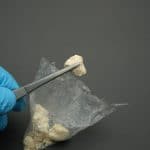- Hair
- Urine
- Saliva
- Blood
- Cocaine Use Symptoms
- How Cocaine is Detected
- Adverse Effects of Cocaine
- Getting Help
How long does cocaine stay in the body?
Cocaine has a half-life of around one hour, therefore it takes about one hour for half the amount taken to leave your body. But drugs are unpredictable, and the half-life may not always follow this formula. Here’s why:
- Physical traits of a cocaine user will affect how long cocaine takes to leave the body. A higher metabolism will process and remove the drug quicker than a slower metabolism. Body fat content, diet, hydration and genetics all play a role in how quickly (or not) your body metabolizes a drug.
- The liver is the main organ responsible for metabolizing drugs. Someone who eats a highly processed diet, regularly drinks alcohol or consumes other drugs may have an already over-worked liver. This means cocaine will take longer to process and leave the body.
- The purity of a drug and how the person used it will have a significant impact on the length of time cocaine stays in their system. A highly pure form of cocaine will take longer to leave than a less pure version, simply because there is more of the drug in the purer form.
- Injection of a drug has an impact on its half-life because your body will have more of the drug in the bloodstream. Smoking and snorting generally allow for shorter half-life of a drug, but not much.
- How long and how often one uses cocaine will significantly alter the length of time a drug stays in your system. Studies at Harvard University showed that longer use and higher dosages create a situation where the drug is stored in the tissues and reside for a few weeks, months or longer.
- Combination of Cocaine and Alcohol will remain in your system for a longer time period. Alcohol binds with the cocaine molecule and keeps it in the body longer.
How Long Does Cocaine Stay in Your Hair?
Cocaine can be detected in the hair for up to three months or more. For the long-term user, cocaine can be detected for an even longer period of time. Hair grows about one-half inch per month. For a heavy user whose hair is 6 inches long, cocaine use could be detected for a year, depending upon the health of their hair.
How Long Does Cocaine Stay In Your Urine?
Cocaine is only detected in the urine for a couple of days, but the compounds formed when it is processed by the liver, called metabolites, can be detected in urine for several weeks.
How Long Does Cocaine Stay In Your Saliva?
Cocaine in the saliva can be detected only for a couple of hours, making saliva tests almost useless in screening for cocaine use.
How Long Does Cocaine Stay In Your Blood?
Normally, cocaine in your blood can be detected anywhere between 12 hours to 24 hours after use. Some of the factors listed above can impact this time period, but only slightly.
Cocaine Use Symptoms
Recognizing cocaine use in a loved one can help prevent a more serious situation. When a person uses cocaine, they may be more confident, happy or active. Excessive talking, dilated pupils and a runny nose are often physical, telltale signs of use. Behavioral changes also occur when someone is using cocaine. These may include:
- Loss of appetite
- Secretive behavior
- Avoidance of family
- Poor judgment
- Agitation
- Depression
How Cocaine is Detected in Your System
Drug testing is the formal way of learning if someone is using or abusing cocaine. Most types of standard drug testing will look for cocaine or its metabolites in the results.
There are various ways to test for drug use and which is used will depend on why the test is being administered. While drug testing may look for metabolites, a single dose of cocaine may yield different results for each type of test.
A urine test may detect metabolites anywhere from two days to two weeks. They may show up in a blood test for up to 48 hours while saliva testing can also detect them for up to two days.
Of course, as said, these tests will be unpredictable for each person, and will depend on the factors listed above. The following are common tests used in drug testing:
- Urine Test – This is the most common type of testing used by employers and results can be realized within minutes. Urine tests are considered non-invasive and often used for random drug testing. They are accurate, but due to a rise in products sold to alter the test to create a false-negative, some who administers it may insist on being present when the sample is collected.
- Blood Test – Even though they are nearly impossible to beat and the most accurate, blood tests for cocaine are used less often due to cost, time and how invasive the procedure is. But due to the accuracy, they may be required for insurance reasons or used in an emergency hospitalization situation.
- Hair Sample – Hair is known to hold various chemicals or toxins for long periods of time; even for years. A drug test using hair samples may be utilized by corporations or probation officers to regularly check for drug use. It has a longer window of detection, but is sometimes criticized as a positive result may not necessarily indicate when a drug was used. Testing experts recommend hair testing to detect drug use history.
- Saliva Test – This type of test has a shorter window for detection than other types of testing, although it is highly accurate. Because it is easy and cost-effective, it may be used at home or in treatment facilities as a deterrent to drug use.
Drug testing may be administered as a pre-employment qualification, safety issue, insurance requirement or hospitalization. Each type of testing is unique in what it may show. Since how long cocaine stays in your system is determined by many individual factors, abstinence from a drug is the best way to pass a drug test.
Adverse Effects of Cocaine Use
Although tolerance to cocaine may increase with longer term or heavy use, the risk associated does not decrease. In fact, as the drug and metabolic substances build up in the tissues, the health risks increase. Because cocaine directly affects the brain, mental health issues may also develop. Some of the more serious ones include:
- Irritability
- Anhedonia (inability to feel pleasure)
- Heart palpitations
- Panic attacks
- Nosebleed and damaged nasal tissue
- Swallowing problems
- Loss of appetite
- Inflammation of the digestive tract
- Inflammation of heart muscle
- Chest pain
- Bleeding of the brain or stroke
- Vascular damage
- Seizures
- Reduction in brain matter
- Psychosis
Unfortunately, the more serious problems like brain bleeding can go unnoticed by a person using cocaine. Cardiovascular problems can remain undetected for years until a fatal incident occurs.
This is because the damage is often small, and increase as use continues. The length of time that cocaine stays in your system compounds the damage and health risks.
Even though the effects wear off quickly after use, the drug becomes embedded in various tissues throughout the body, continuing damage that may become irreversible.
Treatment for Cocaine Addiction
Treatment for cocaine addiction varies greatly depending upon the person, the type of cocaine used, and the length of time.
Lifestyle, mental health, or co-addiction also determine what type of treatment will work for a patient. Because cocaine is an extremely addictive drug, it is often abused to the point that physical detoxification is required to begin addiction treatment.
However, being a fast-acting drug, this stage of treatment may be done at home with the help of an outpatient facility. Cocaine may remain in bodily tissues for a long period of time after heavy use, and abstaining from the drug often results in side effects or withdrawal symptoms.
If you or a loved one are struggling with cocaine addiction, call Northeast Addictions Treatment Center to get you on the path toward recovery today!
Written by
Northeast Addition Editorial Team
©2024 Northeast Addition Center | All Rights Reserved
This page does not provide medical advice.









